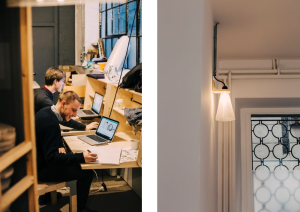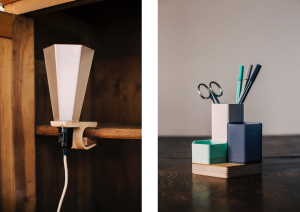
Machines Room is now hosting new residents Julien Vaissieres and Dylan Bahnan as they develop their project Plyset. We wanted to know more about their background and how the whole collaboration came to be:
Can you tell us a bit about your backgrounds as makers, and your practice and areas of interest?
We met at the Machines Room in London and started to collaborate on the ‘Plyset’ project last March. We’re both obsessed with making and how digital and local manufacturing can put the right product for the right person in the right place. One thing we’re excited about is that the way we make things is changing. Digital fabrication, local workshops and a more open way of making are becoming part of the new industrial age.
Can you tell us a bit about what you’ve been working on, and what you will be working on, at Machines Room?
With the Plyset project we’ve worked actively to pursue the goals of the FabCity on a small scale, using a maker space as a cost effective factory to digitally manufacture lamps using plastic from recycled bottles and desk organisers from a corn based plastic, both on a made to order basis.
Plyset was started with the idea that the digital fabrication manufacturing tools available in a maker space can be made to create consumer standard products, in an economically viable way. With a well-documented manufacturing process, they can be made locally and globally, adapting to the local materials, culture and trends of the community.
During our residency we’ll be trying to refine how we make, to make it less wasteful, more human friendly and more repeatable. We’ll be working on how we communicate our message. We’re planning to spend the month dividing our time between working on our new site, clarifying the goals of PLYSET and actively working to pursue them by improving our ‘perpetual printing process’. By the end of the residency we aim to have the 3D printer capable of continually printing pots and lamps without our supervision, a blog post of our process explaining how someone would go about doing it themselves and a shiny new site to post it on.
Has having access to the machines, expertise and community at Machines Room influenced your work and practice, if so then how?
We’ve been working with Machines Room for a while now and it’s been an invaluable resource for us. Having industrial machines and the workshop accessible to use has meant we’ve been able to make things that would’ve been too expensive or too difficult; without having to worry about the tools we’ve been free to try more and be more creative. The team at Machines Room have a diverse wealth of information that they’re always happy to share, and with their help its easier to make the right decisions. Having a place to meet the rest of the community has really spurred us on; there is always someone around who’s having a similar problem who can help or who needs help.
Dylan:
I studied industrial design at Brunel University and started with a focus on UX and digital design before swapping the keyboard and mouse for a sander and apron. Until a few months ago I was a production manager at Unto This Last where I solidified my love of lean. More than anything I like to make exciting technology easy to use, so it’s easier to do more with it.
Julien:
I grew up in France and studied architecture at the University of Brussels ULB. I’ve always been a maker from making toys when I was a kid to co-creating one of the first FabLabs in Brussels, so everyone could have free access to digital tools back in 2011. After a thesis revolving around makerspaces, their uses and community, my partner and I moved to London to create our own tiny digital factory – L’Etabli (workbench in French). Probably the smallest in London! From building my own CNC machine to prototyping ideas and making finished products, I have experience in all types of processes.
